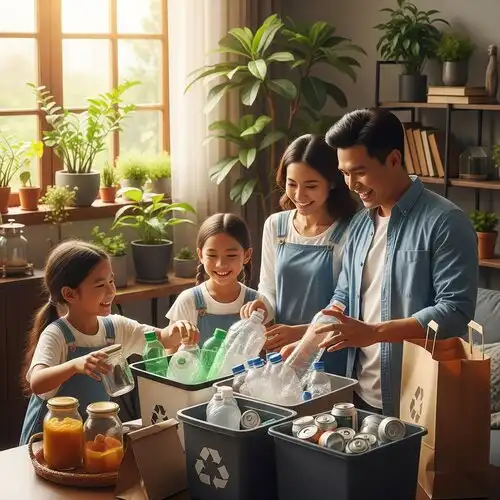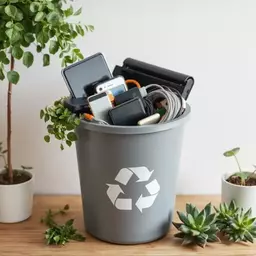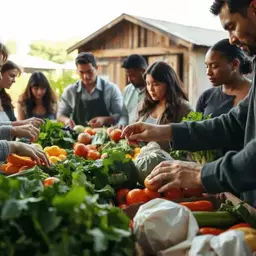Did you know that effective recycling can significantly reduce waste and help protect our planet? It's a powerful tool in our hands that can lead to a cleaner environment!
What You Will Learn
- Understand the importance of recycling in conserving natural resources and reducing pollution.
- Familiarize yourself with locally accepted recyclable materials to maximize your efforts.
- Learn the significance of rinsing and cleaning recyclables to prevent contamination.
- Set up an efficient recycling station at home to streamline your recycling process.
- Identify single-use items and explore sustainable alternatives to enhance recycling outcomes.
- Discover the benefits of composting and how it can help reduce organic waste effectively.
- Get involved in community initiatives to amplify your recycling efforts and make a greater impact.
Key Takeaways for Effective Recycling Practices
Understanding how to recycle effectively can significantly reduce waste and contribute to a healthier environment. Here’s a summary of vital practices for recycling:
Know What You Can Recycle
- Paper and cardboard
- Glass bottles and jars
- Plastics #1 and #2
- Metals like aluminum and tin cans
Rinse and Clean Recyclables
Contaminated materials can lead to recycling failures. Ensure your recyclables are clean:
- Rinse containers to remove food or liquids.
- Remove sticky labels when possible.
- Let items dry to prevent contamination.
Setup a Recycling Station
- Use separate bins for different materials.
- Label each bin clearly.
- Keep bins in a convenient location.
Avoid Single-Use Items
Reducing single-use products enhances recycling outcomes:
- Use reusable shopping bags.
- Opt for glass containers for food storage.
- Choose cloth napkins over paper ones.
Simple Tips for Effective Recycling at Home
Recycling at home is not only a simple task but also a vital step towards protecting our planet. At Eco Habits Daily, I believe that understanding how to recycle effectively can help us all contribute to a healthier environment. Let’s explore some helpful tips that can make recycling a seamless part of our daily lives!
The Importance of Recycling in Our Daily Lives
Recycling plays a crucial role in reducing the amount of waste that ends up in landfills. By recycling, we conserve natural resources and minimize pollution, which benefits all of us! When we recycle everyday items, we’re not just cleaning up our homes but also taking meaningful steps towards sustainability.
Understanding the Impact of Recycling on the Environment
Every time we recycle, we contribute to a circular economy, where materials are reused and repurposed instead of being discarded. This process significantly reduces the need for new raw materials, ultimately lowering energy consumption and greenhouse gas emissions. It’s a small action that can lead to a big impact!
How Effective Recycling Practices Can Reduce Waste
Implementing effective recycling practices can drastically reduce the amount of waste we produce. Here are a few key benefits:
- Conserves valuable natural resources like timber, water, and minerals.
- Reduces energy usage, leading to fewer carbon emissions.
- Prevents pollution by reducing the need to collect and process new raw materials.
Know What You Can Recycle
One of the first steps to effective recycling is knowing what materials can be recycled. Many people are surprised by the variety of items that can be reused! At Eco Habits Daily, we encourage you to familiarize yourself with the recyclable materials in your area. The EPA offers comprehensive resources to help you understand what materials are commonly recycled.
A Comprehensive List of Commonly Recyclable Materials
Here’s a helpful list of items that are generally accepted for recycling:
- Paper and cardboard (e.g., newspapers, boxes)
- Glass bottles and jars
- Plastics labeled with recycling symbols #1 (PETE) and #2 (HDPE)
- Metals like aluminum cans and tin cans
Local Recycling Guidelines: Why They Matter
Understanding local recycling guidelines is essential because recycling rules can differ significantly by region. Following these guidelines ensures that your efforts lead to successful recycling. It also prevents contamination, which can spoil entire batches of recyclables!
Variations in Accepted Materials Across Regions
Before recycling, check with your local waste management or recycling center for specific guidelines. Some areas may accept items that others do not, so it’s vital to be informed. For example, certain plastics or electronic waste might have dedicated collection points.
Understanding Recycling Symbols and Their Importance
Recycling symbols provide useful information about how to handle various materials. These symbols help identify what can be recycled and how to do it correctly. Familiarizing yourself with these symbols can save time and effort when sorting your waste!
Rinse and Clean Recyclables
Washing and rinsing recyclables is more important than many realize. Contaminated materials can cause entire batches of recycling to be discarded! By ensuring your items are clean, you’re helping the recycling process run smoothly. The EPA provides guidelines on how to prepare common recyclables, including rinsing and cleaning.
The Role of Clean Materials in Preventing Contamination
Clean recyclables help prevent contamination, which can lead to significant waste. When recycling centers receive dirty materials, they often have to throw them away, which defeats our recycling efforts. Therefore, a quick rinse can make a big difference!
Practical Steps for Ensuring Clean Recyclables
Here are some tips for making sure your recyclables are clean:
- Rinse containers with water to remove leftover food or liquids.
- Remove labels when possible to avoid sticky residues.
- Let items dry before placing them in the recycling bin.
Frequently Asked Questions About Recycling
- What are the most commonly recycled materials?
- The most commonly recycled materials include paper, cardboard, glass bottles and jars, certain plastics (labeled #1 and #2), and metals like aluminum and tin cans.
- Why is it important to rinse and clean recyclables?
- Rinsing and cleaning recyclables prevents contamination, which can lead to entire batches of recycling being discarded. Clean materials ensure a smoother recycling process.
- How can I set up an effective recycling station at home?
- Use separate bins for different materials (paper, plastics, metals, and glass), label each bin clearly, and keep your recycling station in a convenient location like near your kitchen or garage.
- What are some alternatives to single-use products?
- Consider using reusable shopping bags, stainless steel or glass containers for food storage, and cloth napkins instead of paper ones.
- What can I compost at home?
- You can compost fruit and vegetable scraps, coffee grounds and filters, and eggshells. Avoid composting meat, dairy, and oils, as they can attract pests.
Separate and Sort Your Materials Effectively
Setting up a recycling station at home can streamline your recycling efforts and make it easier to sort materials. When everything has its place, recycling becomes a more manageable task!
Setting Up a Recycling Station: Tips for Home Organization
Here are some easy ideas to create your recycling station:
- Use separate bins for paper, plastics, metals, and glass.
- Label each bin clearly to avoid confusion.
- Keep your recycling station in a convenient location, like near your kitchen or garage.
Understanding Single-Stream Recycling: Pros and Cons
Single-stream recycling allows you to toss all your recyclables into one bin, which can be super convenient! However, it can also lead to higher contamination rates. It's important to weigh the benefits against the potential downsides.
Waste Segregation: Best Practices for Efficient Sorting
Proper waste segregation ensures that materials are recycled effectively. Here are some best practices:
- Separate organic waste from recyclables.
- Keep hazardous waste out of your regular recycling bin.
- Educate family members about the importance of sorting.
Avoiding Single-Use Items for Better Recycling Outcomes
One of the best ways to improve recycling outcomes is by cutting down on single-use items. These products often contribute to waste that cannot be recycled effectively! You can find more information about the basics and benefits of recycling on the EPA website [3].
Identifying Contaminants That Ruin Recycling Efforts
Some common contaminants include:
- Food residue on containers
- Plastic bags that can tangle in machinery
- Non-recyclable items mistakenly placed in recycling bins
Alternatives to Single-Use Products: Sustainable Choices
Switching to reusable products is a fantastic way to reduce waste. Consider these sustainable alternatives:
- Reusable shopping bags instead of plastic ones
- Stainless steel or glass containers for food storage
- Cloth napkins instead of paper ones
Eco-Friendly Options to Reduce Plastic Waste
We can all take action to cut down on plastic waste. Here are a few eco-friendly options:
- Choose products with minimal packaging.
- Support brands that use sustainable materials.
- Participate in local clean-up events to help remove plastics from the environment.
Composting for Effective Waste Reduction at Home
Composting is a wonderful way to reduce waste while enriching the soil at the same time! By composting organic waste, we can divert a significant amount from landfills.
Getting Started with Composting: Techniques and Tips
Starting a compost bin can be easy! Here are some simple tips to get you going:
- Choose a compost bin or a designated spot in your yard.
- Add a mix of greens (food scraps) and browns (dry leaves) for a balanced compost.
- Turn the compost regularly to aerate it and speed up the decomposition.
The Environmental Benefits of Composting Food Waste
Composting food waste helps reduce methane emissions from landfills and enriches the soil for gardening. It’s a win for both the planet and your garden!
Managing Organic Waste: What to Compost
Here’s a list of items you can compost:
- Fruit and vegetable scraps
- Coffee grounds and filters
- Eggshells
Remember to avoid composting meat, dairy, and oils, as they can attract pests.
Pro Tip
Did you know? By reducing your reliance on single-use plastics, you can significantly enhance your recycling efforts and contribute to a healthier planet. Consider swapping out disposable items for reusable alternatives, such as stainless steel water bottles or cloth shopping bags. Not only will this cut down on waste, but it can also save you money in the long run!
Summarizing Effective Recycling Practices
As we wrap up our discussion on recycling, it’s crucial to reflect on the steps we can take to ensure our efforts are effective and impactful. Adopting simple yet powerful recycling practices can significantly reduce the amount of waste that ends up in landfills. At Eco Habits Daily, we believe that every small action counts, and together we can create a cleaner, greener planet!
Here are some key takeaways to keep in mind as you embark on your recycling journey:
- Know what materials are recyclable in your area.
- Always rinse and clean your recyclables to prevent contamination.
- Set up a designated recycling station at home for better organization.
- Avoid single-use items to enhance your recycling outcomes.
- Consider composting to effectively reduce organic waste.
Encouraging Community Involvement in Recycling Initiatives
Recycling isn’t just an individual effort; it’s a community endeavor! When we come together, we can amplify our impact. By encouraging friends, family, and neighbors to join in, we can create a ripple effect of positive change. Hosting community events, like local recycling drives or educational workshops, can make a huge difference.
Consider these ideas to spark community involvement:
- Organize neighborhood clean-up days.
- Share recycling tips on social media platforms.
- Create a community recycling challenge with small rewards for participation.
The Role of Donation Centers in Reducing Waste
Another fantastic way to reduce waste is through donation. Many items that we may no longer need or use can find a new home through local donation centers. Instead of tossing them in the trash, consider donating clothes, furniture, or household items. This not only helps others but also decreases landfill waste!
Here’s a quick list of items perfect for donation:
- Clothing and shoes
- Books and toys
- Household goods and kitchenware
- Electronics in working condition
Engaging with Recycling: Call to Action
Start Your Recycling Journey Today
Are you ready to take the next step in your recycling journey? Let’s dive into some practical ways you can make a difference starting today! The first step is to explore local resources for recycling guidelines. Each community often has specific rules about what materials can be recycled, so understanding these is vital.
Explore Local Resources for Recycling Guidelines
Your local waste management website is a great place to start! Many cities provide comprehensive lists of recyclable materials and drop-off locations. Don’t hesitate to reach out to your local officials if you have questions. They’re there to help you!
Join Community Programs to Enhance Your Recycling Efforts
Joining community programs can significantly boost your recycling efforts. Look for local initiatives that focus on waste reduction and recycling awareness. By participating, you not only gain valuable knowledge but also connect with like-minded individuals.
Participate in Community Clean-Up Initiatives
Lastly, consider participating in community clean-up initiatives! Not only do these events promote recycling, but they also foster a sense of community and shared purpose. Check local listings for upcoming events or perhaps even organize one of your own!
Remember, each step we take brings us closer to a sustainable future. Together, we can make a real difference, one recycled item at a time!
Recap of Key Points
Here is a quick recap of the important points discussed in the article:
- Understand what materials are recyclable in your area to maximize your efforts.
- Always rinse and clean your recyclables to prevent contamination and ensure successful processing.
- Set up a designated recycling station at home to streamline the sorting process.
- Reduce reliance on single-use items to enhance recycling outcomes and minimize waste.
- Consider composting organic waste to effectively reduce landfill contributions.
- Engage with your community to promote recycling initiatives and share valuable practices.
- Donate unwanted items to local centers to reduce waste and help those in need.










